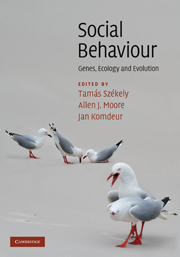Book contents
- Frontmatter
- Contents
- List of contributors
- Introduction: The uphill climb of sociobiology: towards a new synthesis
- Profile: Undiminished passion
- Part I Foundations
- Part II Themes
- Part III Implications
- 16 Personality and individual social specialisation
- Profile: Behavioural ecology, why do I love thee? Let me count the reasons
- 17 Molecular and genetic influences on the neural substrate of social cognition in humans
- Profile: Anonymous (and other) social experience and the evolution of cooperation by reciprocity
- 18 Population density, social behaviour and sex allocation
- Profile: Social theory based on natural selection
- 19 Social behaviour and speciation
- Profile: Look to the ants
- 20 Social behaviour in conservation
- Profile: The handicap principle and social behaviour
- 21 Prospects for research in social behaviour: systems biology meets behaviour
- Species index
- Subject index
- References
Profile: Social theory based on natural selection
Published online by Cambridge University Press: 05 June 2012
- Frontmatter
- Contents
- List of contributors
- Introduction: The uphill climb of sociobiology: towards a new synthesis
- Profile: Undiminished passion
- Part I Foundations
- Part II Themes
- Part III Implications
- 16 Personality and individual social specialisation
- Profile: Behavioural ecology, why do I love thee? Let me count the reasons
- 17 Molecular and genetic influences on the neural substrate of social cognition in humans
- Profile: Anonymous (and other) social experience and the evolution of cooperation by reciprocity
- 18 Population density, social behaviour and sex allocation
- Profile: Social theory based on natural selection
- 19 Social behaviour and speciation
- Profile: Look to the ants
- 20 Social behaviour in conservation
- Profile: The handicap principle and social behaviour
- 21 Prospects for research in social behaviour: systems biology meets behaviour
- Species index
- Subject index
- References
Summary
I went into evolutionary biology because I became convinced in 1965 that the foundation for psychology and social theory more generally should, and could, be based on the theory of natural selection.
In 1964, a senior-year course at Harvard in psychology convinced me that that discipline was nowhere near putting itself together as a unified science, and that their approach was, in fact, hopeless at the outset, a series of competing guesses about what was important in human development, none based on any underlying knowledge. Within a year, while writing and illustrating children's books on animal behaviour, I was exposed to animal behaviour (chiefly gulls and baboons), and the logic based on natural selection for interpreting their behaviour. It was at once obvious that this was the logic missing from psychology, and that rooting psychology in biology not only gave it a firm foundation in pre-existing knowledge but also greatly expanded the available evidence, even if you were only interested in humans. I had never had a course before in biology or chemistry, but it seemed worthwhile learning at least the former because of the importance of building a secure scientific foundation for social theory. I spent a year learning biology and began graduate work at age 25.
I then threw myself into a series of interrelated topics – reciprocal altruism, parental investment and sexual selection, parent–offspring conflict, adaptive control of variation in the primary sex ratio, and the evolution of the social insects.
- Type
- Chapter
- Information
- Social BehaviourGenes, Ecology and Evolution, pp. 489 - 490Publisher: Cambridge University PressPrint publication year: 2010



